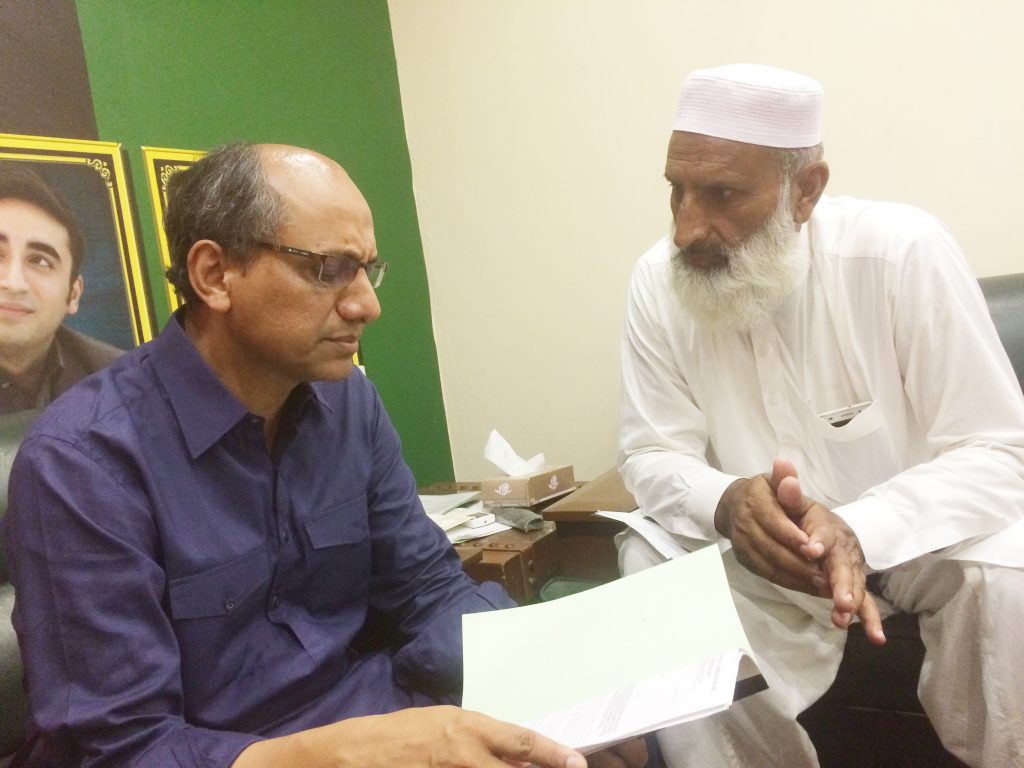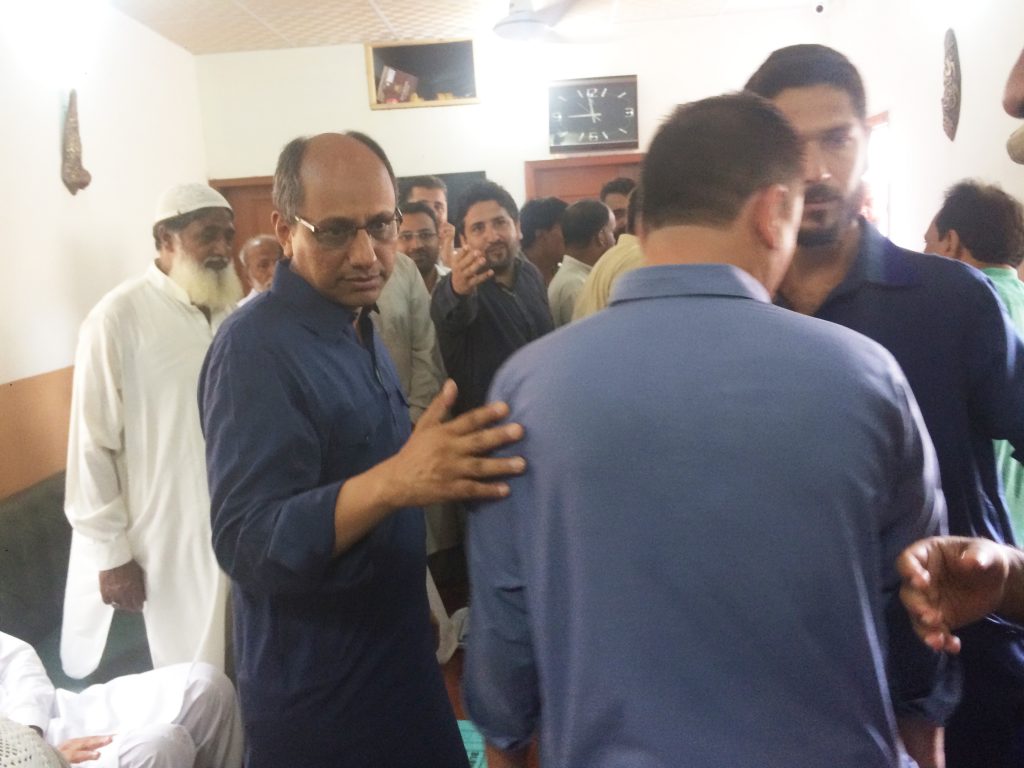Electoral Omens
By Ali Arqam | Newsbeat National | Published 7 years ago

Mumtaz Ahmed Tanoli, an elected vice-chairman of the Pakistan People’s Party (PPP) from Union Council (UC) Haryana Colony of Orangi Town, in District West, Karachi, spent almost a month in the localities of Azam Town, Mehmoodabad, Akhtar Colony, Manzoor Colony, Kashmir Colony and Chanesar Goth of District East. He was campaigning for PPP candidate and former senator, Saeed Ghani, who was contesting the PS-114 by-elections.
Tanoli, a Hindko-speaking economic migrant, is also the elected chairman of Anjuman Ittehad-i-Hazara Karachi, an organisation founded in 1958 by immigrants from different parts of Hazara Division. Tanoli himself shifted to Karachi in the early ’80s. Having a background in the politics of labour unions, he has remained politically and socially active in his own locality.
There are two reasons why Tanoli made such a great effort in District East — a constituency that was far from his own locality. One was the party’s choice of candidate in Ghani, who is very popular in this working-class locality and is always accessible to people from all walks of life. The second reason for Tanoli’s efforts was the presence of people from different parts of Hazara Division in the localities of PS-114.
“Migrants from Hazara Division constitute approximately 40 to 50 per cent of the residents in numerous localities in this constituency,” explains Tanoli.
Citing PPP support among Hazaray waal, Tanoli referred to one of his acquaintances, Syed Azam Shah Tirmizi, a real estate agent who lives in Azam Town and who is a diehard supporter. Tirmizi served as polling agent in the recently held by-elections, “for the fourth consecutive time.” Thrice for Ghani and once for his brother Farhan Ghani, who was elected UC Chairman in 2015, while a Hazaray waal became vice-chairman. “Each time, our party got the maximum votes from our polling station,” boasts Tirmizi. There are other UCs, he says, where the winning contestants are from his community.
People from Hazara Division are locally referred to as Hazaray waal (not to be confused with the Hazaras of Quetta, who speak Hazargi, a dialect of Persian). Hazaray waal are of mixed descent, speaking Hindko, Pashto, Gujri and Kohistani languages. Their Pashtun and Punjabi lineage had, in the past, drawn them to the Punjabi Pukhtoon Ittehad (PPI), a political front that emerged in the late ’80s as a response to the violent ethnic politics of the Muhajir Qaumi Movement (MQM) — later renamed as Muttahida Qaumi Movement. While the leadership was drawn from Punjab and Khyber Pakhtunkhwa (KP), the mid-tier leadership of the PPI consisted largely of Hazaray waal. In the 1988 general elections, when the PPI fielded its candidates in Karachi’s East, West and South districts, it received a total of 105,061 votes. Almost 20 per cent half of these votes were acquired by Irfanullah Marwat, one of the founders of the PPI. An ethnic Pashtun from the Marwat tribe, and son-in-law of the then acting president, Ghulam Ishaq Khan, Marwat bagged 18,131 votes, defeating Mian Raza Rabbani among others, to get elected to the Sindh Assembly.
In later years, after the PPI split from within, its support dwindled and the party disappeared from the political landscape. But Marwat and others, who kept changing their political loyalties since the early ’90s, managed to stay relevant in the politics of the metropolis. Marwat was able to provide ample opportunities to his support base among ethnic Pashtuns and Hazaray Waal, in acquiring jobs at different government institutions, such as the police. These recruitments earned him repute among the residents of these localities, and he also derived support from his old PPI connections. Thus, he managed to win thrice in the general elections, and once in a by-election.
He did not contest any of the three general elections from his constituency in the ’90s, and won a by-election in 1992. He chose to contest the 1993 general election from the adjacent constituency of PS-89 (now PS-113). After the delimitation in 2002, he had a head-to-head contest with the MQM in the general elections. In 2002, Marwat won with the margin of 1,001 votes, and in 2008, he was defeated by MQM candidate Rauf Siddiqui, by a thin margin of 800 votes. In 2013, Marwat won by a margin of 6,825 votes. The MQM found this hard to digest and took up the matter with an election tribunal, making allegations of rigging. Marwat’s aides had rigged with such clumsiness and lack of discretion that it got him into trouble with the tribunal, which ordered NADRA to verify the voters’ thumb impressions.
NADRA’s report not only confirmed irregularities in this particular constituency, but raised serious questions over the veracity of the entire electoral exercise in the city, and across the country. The report said that only 11 per cent votes (10,007 of the 92,731) cast could be authenticated, as the fingerprints on the counterfoils correctly matched with fingerprint data of registered voters. The thumb impressions on 63,469 ballots could not be compared or matched through the NADRA database because they were of very poor quality, while 581 ballot papers lacked any thumb impressions.
Furthermore, 14,234 ballot papers contained invalid national identity card numbers, and 378 voters were registered in other constituencies. There were also duplicate votes and multiple votes on a single identity card number. A CNIC of one Muhammad Arif Sattar, a resident of Azam Town, was used to cast 44 votes.
The report led to the de-notification of Marwat, when the election tribunal declared the election results null and void in 2014. Marwat approached the Supreme Court of Pakistan against the decision, but it upheld the tribunal’s decision in May 2017, and ordered a re-election.
Things have changed significantly in the last couple of years. The MQM, which won in most of the UCs in this constituency, and bagged a majority across the city, has found itself in conflict with the PPP over the powers of the local government. At the same time, it has been through an internal crisis, which resulted in a split. The changed law and order situation made it hard for any contender to manipulate the electoral process. Keeping an eye on these altered ground realities, Marwat, in a desperate bid to win over the support of the ruling PPP, reportedly hinted at joining the PPP, as he had gotten a nod of approval from the party’s leadership. But these reports, along with his meeting with Asif Ali Zardari met with a strong reaction from within the PPP, particularly from Bakhtawar and Aseefa Bhutto-Zardari. Marwat blamed Saeed Ghani for misguiding the Bhutto-Zardari sisters about him. Nevertheless, it obstructed his move to the party, and he announced his support for PTI candidate, Najeeb Haroon, in the subsequent by-elections.
The PPP fronted Ghani as a candidate in the by-elections. Ghani has served as a general secretary of the PPP in Karachi and is among those who fully understand the city’s political dynamics. He has been active on the political scene for the last two decades, after the tragic death of his father, Usman Ghani (see interview). Saeed Ghani, a leader of the Muslim Commercial Bank (MCB) labour union, contested the 1990 general elections from this constituency and bagged around 9,000 votes against an MQM candidate.
Ghani won twice as UC Nazim in the local bodies’ elections in 2001 and 2005 and was joint opposition leader in the city council. His nomination got the approval of party workers from all parts of the city.
Anthony Naveed, a rights activist from the Christian community, is a resident of one of the Christian neighbourhoods in PS-114. He has been an active political worker, and has formerly worked as a special assistant to the chief minister of Sindh, on interfaith harmony. In a recent reshuffle by PPP Chairman Bilawal Bhutto-Zardari, Naveed was elevated to secretary information of the minority wing of the PPP in Sindh. Naveed is a close aide of Ghani’s, and was at the forefront of his campaign, proving instrumental in getting him the support of the Christian community.

“UCs Akhtar Colony and Azam Basti of District East fall under the limits of PS-114,” explains Naveed. “Both of these UCs have Christian voters and a sizeable Hindu population as well,” he continues. “The elected vice-chairman of the PML-N from UC Akhtar Colony is Miss Bimla Rosemary, while the General Councillor of UC Azam Basti is Naimat Gill of the PPP.”
Naveed affirms his community’s support to the PPP by saying, “It’s the only party which genuinely believes in equal rights for all the citizens, irrespective of their religion, or ethnic identity. Christians in these neighbourhood are 99 per cent Punjabi-speaking, but they support the PPP.” Naveed describes the MQM as “a liberal political force,” but laments that “their politics of coercion have earned them a bad reputation, as our people living in the localities dominated by MQM supporters weren’t free to vote for the candidate of their choice.” According to Naveed, when they did get an opportunity to vote freely, they chose the PPP.
Seema Rana Maheshwary, a civil society activist and member of the Network of Working Communities (NOW), moved to a rented flat in Azam Basti in March 2017. “It’s not easy for members of the minority communities to rent a house anywhere in the city,” complains Maheshwary. “One of the few options is the Hindu neighbourhood here in Azam Basti.” According to Maheshwary, both Christians and Hindus live in Azam Basti, which also has an indigenous Sindhi population of the scheduled castes, as well as Hindu traders, locally referred to as deewans, who have moved here from other districts of Sindh. They run small businesses, or have jobs in various government departments. There are also Christians who speak Punjabi.
Ghani won the elections while Farooq Sattar’s MQM Pakistan (MQM-P) clocked in as the runner-up. The MQM-P had won most of the local bodies’ positions in 2015 and attempted to hold on to these, but were unable to do so. The PPP considers the PS-114 victory a good omen and expects an increased footprint in the city.
Despite the boycott call from MQM-London (MQM-L) and the presence of the Pak Sarzameen Party (PSP), the MQM-P managed to garner 18,000 votes, dispelling any perceptions of dwindling support.
Those associated with MQM-L, however, were jubilant over the defeat of MQM-P, attributing it to the boycott call as well as the fact that MQM-P had sought the support of Marwat. The choice of Kamran Tessori as a candidate, a relative newcomer, also sparked discontent among some sections of the party.
“This was a high-intensity campaign,” enthused a MQM-L supporter, “on one front, it was up against a candidate backed by the provincial government, and on the other, a candidate of the PTI. The MQM-P needed a candidate who could spend extravagant amounts on the campaign, as there was no picture of Altaf on electric poles to automatically draw support.”
This, explained the supporter, should be an eye-opener for the MQM-P leadership, as parting ways with the party’s founder didn’t help them in their run-ins with law enforcement agencies, or with the PPP. The defeat has just added to their humiliation.
At the moment, though, the PPP leadership seems to be reading too much into the results of PS-114. According to overall performance indicators, they hardly have anything to boast about. The PPP’s only hope lies in the internal crises of its opponents — the MQM’s various factions — or the lack of interest from the two national players, the PML-N and the PTI.
Ali Arqam main domain is Karachi: Its politics, security and law and order


